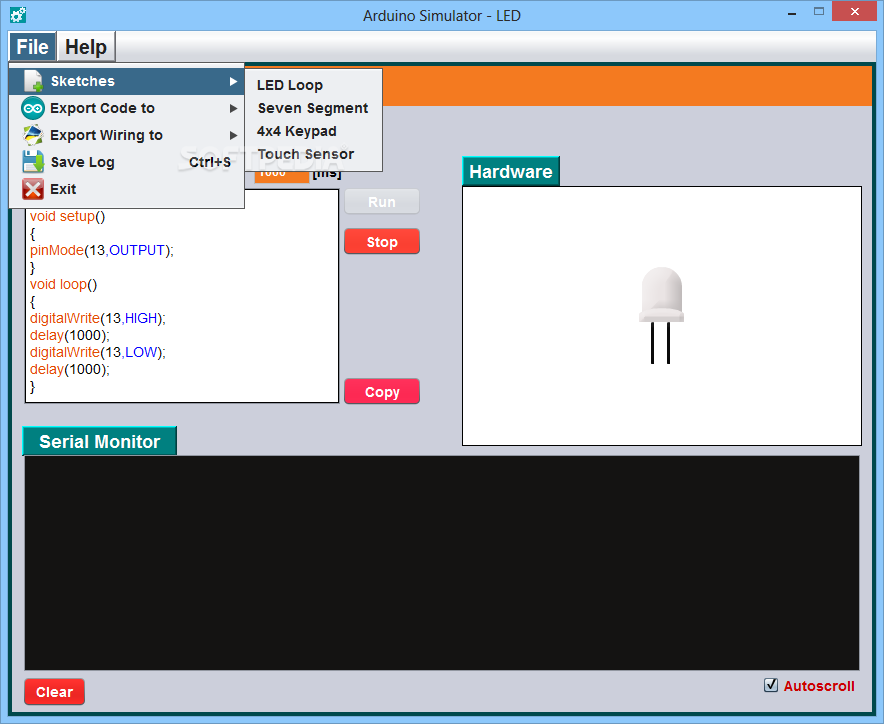
You can use any of the following: • Proteus by Labcenter This is an excellent simulator which combines simplicity with its many features to make Arduino simulations a walk in the park. The simulator has made inroads in diverse industries including; automotive, IOT and education. It is compatible with Windows and Linux. Arduino Simulator for PC This is also one of the best simulators out there for a couple of reasons. These reasons include its cross-platform features, sketch designs, debug sketches and develop complicated ideas with ease. It has its base on both Windows and Linux.
Users can also select the type of Arduino—Mega, Nano and Leonardo—they would like to use as well as an LCD display. PSpice for Arduino I believe every electrical and electronics student must have come across PSpice during the months spent learning the basics of circuit design and programming. But for those who don’t know what PSpice is, it is an intuitive simulator which can be used for Arduino simulation due to the many features integrated into the application. Is supported by Windows and Linux operating system and comes in different modules or types.
A good point -- UnoArduSim sure can't simulate any oddball faults/bugs inside your specific external hardware I/O device, but by attaching the corresponding UnoArduSim 'fault-free' IO device you can tell you if your code is the problem. The limited set of these virtual IO devices and supported libraries (which could be expanded in a following release) will hopefully be sufficient for most users, and if your particular device is not supported yet, you can try temporarily commenting-out/replacing the section of code that accesses it so that you can still test the other parts of your program. I would encourage people using the simulator to teach Arduino use to encourage a good design/ development skill along the road to coping with the fact that the simulator probably WON'T simulate every possible bit of external kit: 'Stuff' boils down to inputs and outputs. For a maybe-almost-too-simple example: Suppose I was using the simulator to develop software for a system to unlock my front door if I press the right buttons on a keypad. In the final product, the Arduino will make an output high to make the door-lock-thingie unlock. FOR THE SIMULATION, I doubt that there is a door-lock-thingie 'device' in the simulator. But there will be an LED.
Arduino Simulator 1.5.1 This Arduino Simulator is designed to simulate your (IO) projects. RetroPC-SIM is an Arduino project to help to understand how pc works. Arduino Simulator is a software developed to create simulation for Arduino. Could anyone help me for a good free arduino uno simulation software for windows.Hope I get an answer. Could anyone help me for a good free arduino uno simulation software for windows.Hope I get an answer. Arduino Simulator for Windows that can be detected by Arduino IDE through a Virtual COM Port.
If I can 'do' the LED in the simulation, I've solved the Arduino and software problems for doing the door lock in the real world. There are also some electronics issues. But I can make a great start on the overall road to success with the simulator. Three cheers for this EXCELLENT initiative. I haven't played with it, but if it even ALMOST works, let's all get busy on.

Etc, and GET THE WORD OUT. If it even almost works, let's make getting it working even better worth the time of the people behind it.
And no, I'm not one of them (^_^). Download problem solved! See post of 22 Jan 15 On 22 Jan 15 I cut down the following, but left parts to highlight the dead end which I suspect remains, and to make the following point, which was originally a PS. There I go getting all excited, rushing in. (Again.) Before we all get behind THIS one, maybe we should explore the field a bit? I had no idea (duh) that this wasn't the first. Foto dlya skinali visokogo razresheniya. Several listed, with brief notes, at.